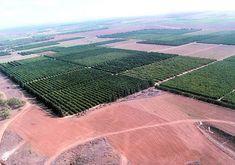
Israeli researchers have identified and mapped a gene which contributes to resistance to salinity. The discovery, by scientists at the Institute of Evolution at the University of Haifa, makes it possible to plant a wide range of vegetable varieties and fruit trees in saline soil and irrigate the crops using saline water.
The findings of the Israeli research team were published in US Journal Proceedings of the National Academy of Sciences (PNAS). Professor Itamar Nevo, head of the institute, who also led the research project, said that the findings will expand the availability land for farming.
The researchers isolated a fungus found in the water of the Dead Sea, Erotium herbariorum. From the fungus they isolated a gene (HOG) which helps the fungus withstand the salinity of the water in the sea, and then implanted this gene into baker’s yeast. The researchers realised that the latter was more resistant to salinity, to oxidation as well as to extreme cold or hot temperatures. Nevo explained in his PNAS report that the gene prevents plants from becoming dehydrated and protects them from salinity. These findings are likely to help alleviate the shortage of agricultural land, and contribute to the development of agriculture in saline regions throughout the world.
The Dead Sea is one of the world's most saline bodies of water: its salinity is 10 times higher that that of ocean water.